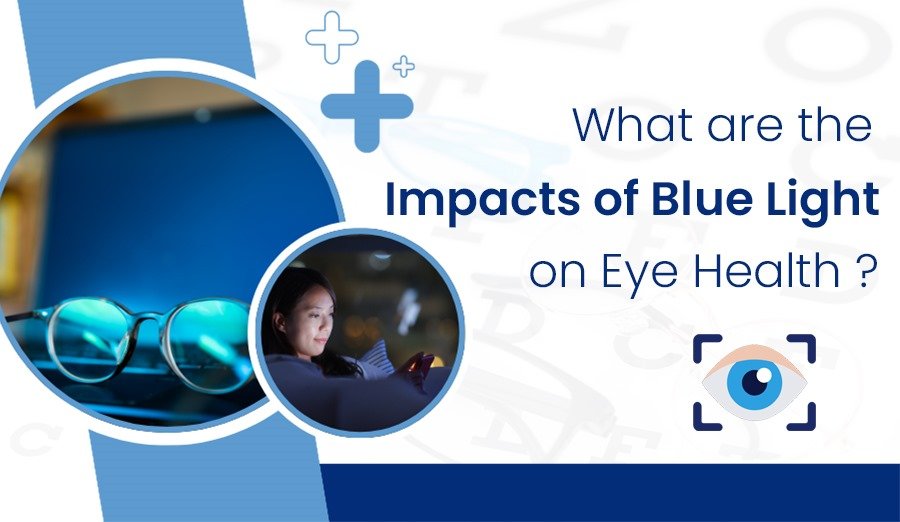Pushpanjali Eye Care, Golpark, Kolkata-700029
Pushpanjali Eye Care, Golpark, Kolkata-700029

By Pushpanjali
09.07.2024
Hello Reader!
Welcome to the blog page of Pushpanjali Eye Hospital one of the best eye hospitals in Kolkata.
In today’s digital age, we are constantly exposed to screens emitting blue light—from smartphones and tablets to computer screens and LED televisions. While blue light is a natural part of sunlight and has benefits such as regulating our sleep-wake cycles, excessive exposure, particularly from artificial sources, can pose risks to our eye health. As a leading eye hospital in Kolkata, Pushpanjali Eye Hospital aims to shed light on why blue light is harmful to the eyes and provide essential tips on how to protect it.

Blue light, a component of the visible light spectrum, has garnered attention due to its potential effects on eye health, particularly in the context of modern digital lifestyles. At Pushpanjali Eye Hospital, a leading eye hospital in Kolkata, we emphasize the importance of understanding these effects and adopting measures to safeguard our vision.
Blue light is characterized by its short wavelength and high energy levels within the visible light spectrum. This unique combination enables blue light to penetrate deeply into the eye, reaching the retina—the light-sensitive tissue at the back of the eye responsible for processing visual information. The ability of blue light to penetrate deeply into the eye raises concerns about its potential to cause oxidative stress and damage to retinal cells over time.

Prolonged exposure to blue light has been linked to potential damage to retinal cells. Research suggests that chronic exposure to blue light may contribute to oxidative damage in retinal tissues, which can lead to cellular dysfunction and compromise the integrity of the retina. This damage is particularly concerning as it is associated with an increased risk of age-related macular degeneration (AMD), a progressive eye condition that affects central vision and is a leading cause of vision loss among older adults globally.
The human body’s natural sleep-wake cycle is regulated by the production of melatonin, a hormone that induces sleepiness and maintains the body’s circadian rhythm. Exposure to blue light, particularly in the evening and nighttime, can disrupt melatonin production. Blue light exposure from digital screens and artificial lighting suppresses melatonin production, leading to difficulty falling asleep and disrupted sleep patterns. This disruption not only affects sleep quality but also impacts overall health, cognitive function, and mood.

Extended use of digital devices that emit blue light, such as computers, smartphones, and tablets, can contribute to digital eye strain, also known as computer vision syndrome. Symptoms of digital eye strain include dry eyes, blurred vision, headaches, and neck pain. Factors contributing to digital eye strain include prolonged screen use without breaks, improper viewing distances or angles, poor lighting conditions, and underlying vision problems.
Consider equipping your devices with blue light filters or screen protectors. These filters reduce the amount of blue light emitted from screens while maintaining visibility. This can significantly lessen the strain on your eyes during prolonged screen use.
Most modern devices offer options to adjust brightness and color temperature settings. Lowering the brightness and opting for warmer color tones (which emit less blue light) can make screen time easier on the eyes. Explore your device’s settings to find these adjustments and configure them for optimal comfort.
Adhering to the 20-20-20 rule can help mitigate eye strain. Every 20 minutes, take a break and focus on something 20 feet away for at least 20 seconds. This practice not only reduces eye strain but also encourages regular blinking, which keeps your eyes moist and refreshed.
Limiting screen use, especially from smartphones and tablets, is advisable at least an hour before bedtime. Exposure to blue light during the evening can interfere with your sleep cycle. Utilize apps or device settings that reduce blue light emission during nighttime use to create a more conducive environment for restful sleep.

Schedule regular comprehensive eye exams with an eye care specialist, such as those at Pushpanjali Eye Hospital in Kolkata. Regular check-ups can help detect early signs of eye conditions and ensure that your eyes remain healthy. Early detection and intervention are key to maintaining optimal eye health.
Blue light is a high-energy, short-wavelength light that is part of the visible light spectrum. It is emitted by the sun and artificial sources such as LED lights, computer screens, smartphones, and tablets. While natural exposure to blue light during the day can help regulate our sleep-wake cycles, excessive exposure to digital devices can be harmful to eye health.
Excessive exposure to blue light can cause digital eye strain, which includes symptoms like dry eyes, headaches, blurred vision, and difficulty focusing. Prolonged exposure may also contribute to long-term issues like macular degeneration. Blue light penetrates the eye more deeply than other types of light, potentially leading to retinal damage over time.
To protect your eyes from blue light, consider using blue light filters or screen protectors on your devices, adjusting screen brightness and color settings to warmer tones, and following the 20-20-20 rule—take a 20-second break to look at something 20 feet away every 20 minutes. Additionally, limit screen time, especially before bed, and use apps or device settings that reduce blue light emission during nighttime.
Blue light glasses are designed to filter out blue light emitted by digital screens. They can be effective in reducing symptoms of digital eye strain, such as headaches and eye fatigue. However, it’s important to choose high-quality glasses from reputable brands and consult with an eye care professional to determine if they are right for you.
Regular eye exams are crucial for maintaining eye health, especially if you frequently use digital devices. Pushpanjali Eye Hospital recommends scheduling a comprehensive eye exam at least once a year. These exams can help detect early signs of eye conditions and ensure that any necessary interventions are made to protect your vision and overall eye health.
As one of the best eye hospitals in Kolkata, Pushpanjali Eye Hospital is committed to providing comprehensive eye care services to our community. Our team of experienced ophthalmologists and eye care professionals is dedicated to educating patients about eye health and offering personalized treatment plans. Whether you need routine eye exams, treatment for eye conditions, or advice on protecting your eyes from blue light, we are here to support you.
In conclusion, while blue light is a common part of modern life, understanding its potential risks and taking proactive steps to protect your eyes are essential. By incorporating these tips into your daily routine and seeking guidance from trusted eye care professionals like Pushpanjali Eye Hospital, you can safeguard your vision and promote long-term eye health. Together, let’s prioritize eye care and ensure a brighter, clearer future for your eyes.